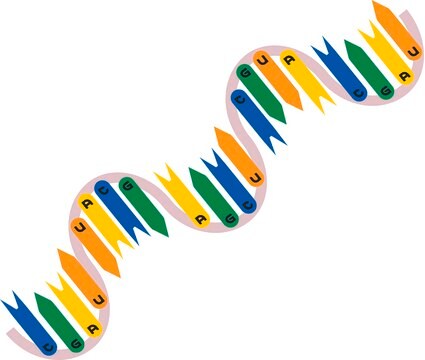R7009
Sty I from Escherichia coli strain carrying pST27
buffered aqueous glycerol solution
Se connecterpour consulter vos tarifs contractuels et ceux de votre entreprise/organisme
About This Item
Numéro CAS:
Numéro MDL:
Code UNSPSC :
12352204
Nomenclature NACRES :
NA.53
Produits recommandés
Forme
buffered aqueous glycerol solution
Concentration
10,000 units/mL
Conditions d'expédition
wet ice
Température de stockage
−20°C
Spécificité
Recognition sequence: 5′-C/C(A,T)(T,A)GG-3′
Ligation and recutting results: After 2-10-fold Sty I overdigestion of 1 μg λ DNA substrate, results in 100% cutting, >95% of fragments can be ligated, and >95% recut.
Heat inactivation: Inactivated at 65 °C for 15 minutes.
Ligation and recutting results: After 2-10-fold Sty I overdigestion of 1 μg λ DNA substrate, results in 100% cutting, >95% of fragments can be ligated, and >95% recut.
Heat inactivation: Inactivated at 65 °C for 15 minutes.
Autres remarques
Supplied with 10x Restriction Endonuclease Buffer SH (B3657).
Forme physique
Solution in 20 mM Tris-HCl, pH 7.5, 0.1 mM EDTA, 50 mM KCl, 10 mM 2-mercaptoethanol, 0.1% gelatine (v/v), 0.01% polydocanol (v/v), 50% glycerol (v/v) at 4 °C
Produit(s) apparenté(s)
Certificats d'analyse (COA)
Recherchez un Certificats d'analyse (COA) en saisissant le numéro de lot du produit. Les numéros de lot figurent sur l'étiquette du produit après les mots "Lot" ou "Batch".
Déjà en possession de ce produit ?
Retrouvez la documentation relative aux produits que vous avez récemment achetés dans la Bibliothèque de documents.
K Mise et al.
Gene, 33(3), 357-361 (1985-01-01)
A new restriction endonuclease, StyI, free of contaminating nuclease activities, has been isolated from Escherichia coli carrying the hsd+ miniplasmid of Salmonella typhi origin. In the presence of 10 mM Mg2+, it recognizes and cleaves a hexanucleotide sequence of 5'-C
C Kessler et al.
Gene, 47(1), 1-153 (1986-01-01)
The properties and sources of all known restriction endonucleases and methylases are listed. The enzymes are cross-indexed (Table I), classified according to their recognition sequence homologies (Table II), and characterized within Table II by the cleavage and methylation positions, the
Cong Zhu et al.
Nucleic acids research, 41(4), 2455-2465 (2013-01-11)
Zinc-finger nucleases (ZFNs) have been used for genome engineering in a wide variety of organisms; however, it remains challenging to design effective ZFNs for many genomic sequences using publicly available zinc-finger modules. This limitation is in part because of potential
Annabel A Ferguson et al.
Methods in molecular biology (Clifton, N.J.), 940, 87-102 (2012-10-30)
The generation of transgenic animals is an essential part of research in Caenorhabditis elegans. One technique for the generation of these animals is biolistic bombardment involving the use of DNA-coated microparticles. To facilitate the identification of transgenic animals within a
TALENs and ZFNs are associated with different mutation signatures.
Yongsub Kim et al.
Nature methods, 10(3), 185-185 (2013-02-12)
Notre équipe de scientifiques dispose d'une expérience dans tous les secteurs de la recherche, notamment en sciences de la vie, science des matériaux, synthèse chimique, chromatographie, analyse et dans de nombreux autres domaines..
Contacter notre Service technique




